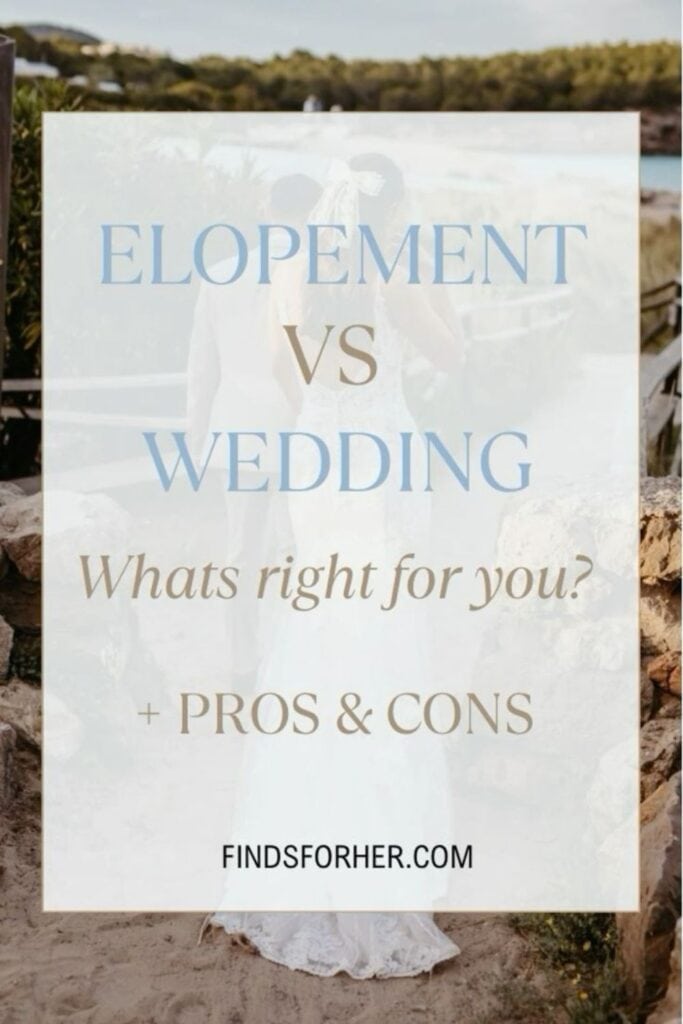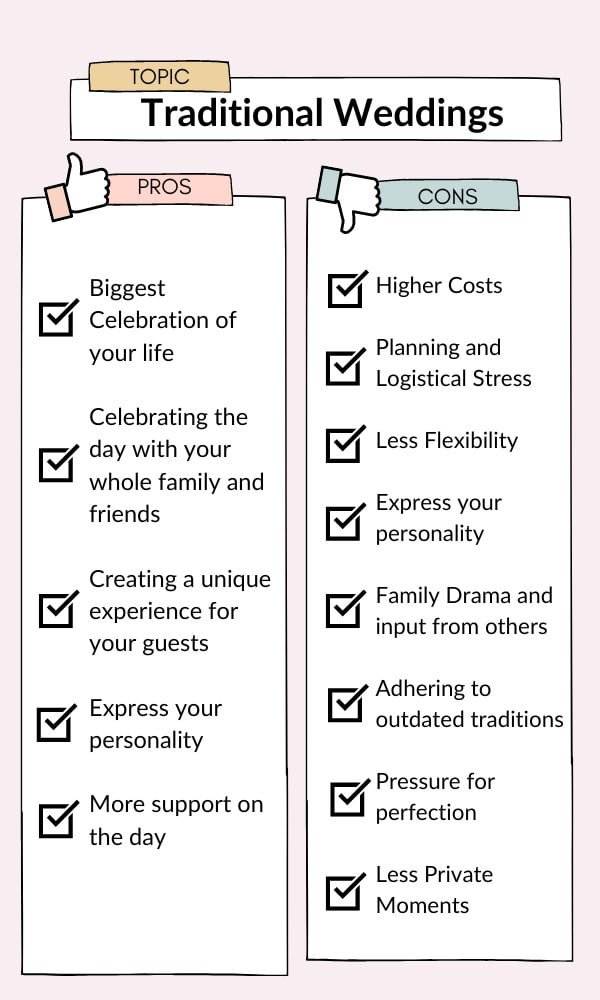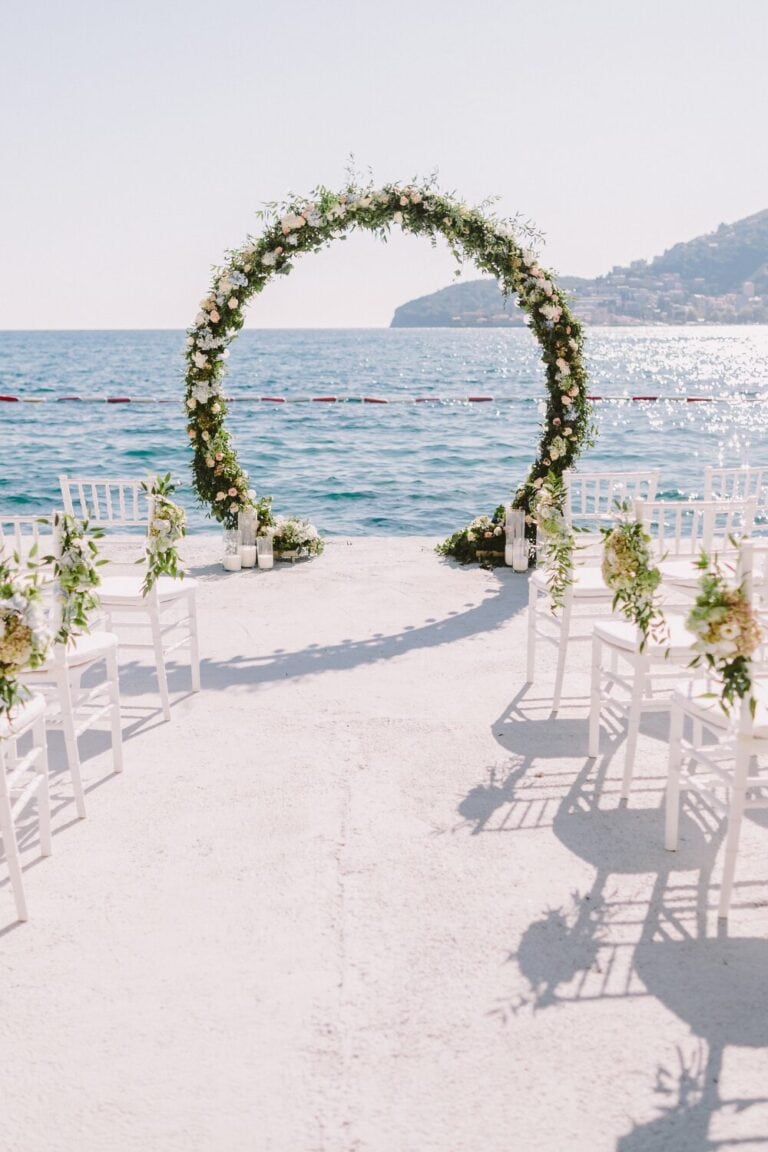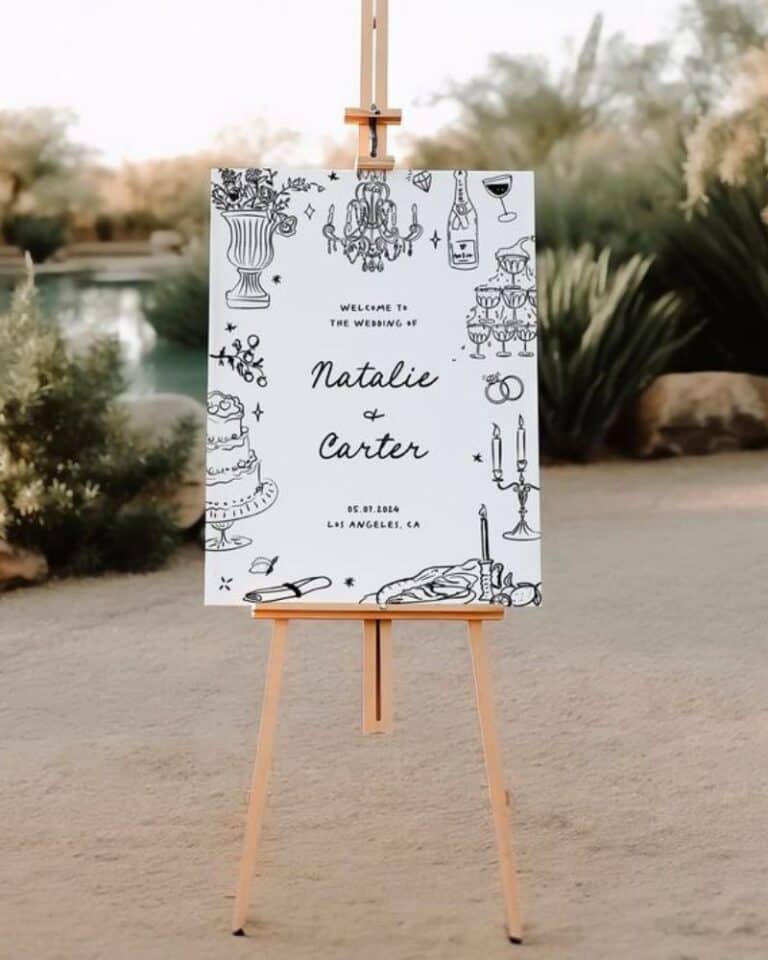Eloping Vs Wedding : What’s right for me? (2024)
This posts is all about Eloping Vs Wedding

Unsure whether to elope, go for a micro-wedding, small wedding, destination wedding, or stick with a traditional wedding? It can be overwhelming to decide right? Whether you’re envisioning a big, festive celebration or a cozy, intimate gathering, there’s no right or wrong way to say “I do.”
This article is here to give you the lowdown on eloping vs wedding. We including all the pros and cons of each, and even an alternative that meets you in the middle! I’ve tried to keep things balanced, but I’ll admit I do have a soft spot for the personal touch of elopements and intimate weddings. Because, at the end of the day, your wedding should be all about what makes you and your partner happiest.
There’s no “one-size-fits-all” answer—each option has its own vibe. Just go with what feels right for you, no matter what anyone (including this article) might suggest!
So let’s delve in…

Eloping Vs Wedding : What’s right for me? (2024)
Table of contents:
- Eloping vs Wedding – What’s right for me?
- What is a Traditional Wedding? + Pros and Cons
- What is Eloping? + Pros and Cons
- What is an Intimate Wedding?
- 3 Final Considerations
What is a Traditional Wedding? + Pros and Cons

A traditional wedding is usually a grand and exciting event, featuring a large guest list and a series of special moments throughout the day. It kicks off with preparations, including hair and makeup for the bride and groom, outfit changes, and stunning pre-wedding photos.
Then the ceremony often takes place in a beautiful religious or ceremonial venue. This is where the couple exchanges vows, and share their love story, in front of their loved ones. So romantic!!
Afterward, the celebration continues with a reception where guests enjoy a delicious meal, raise toasts and dance the night away. Also the day is usually filled with classic traditions like cutting the cake, tossing the bouquet, and sharing that unforgettable first dance.
Traditional Weddings: The Pros and Cons
Here is the short and sweet versions, but keep scrolling to get into these in more detail

The Pros:
- Biggest Celebration of your life
- Celebrating the day with your whole family and friends
- Creating a unique experience for your guests
- Express your personality
- More support on the day
The Cons:
- Higher Costs
- Planning & Logistical Stress
- Less Flexibility
- Family Drama and Input from others
- Adhering to outdated traditions that you don’t value
- Pressure for Perfection
- Less Private Moments
Let’s delve into these points in more detail…
The Pros of Traditional Weddings
1. Biggest Celebration of Your Life
A traditional wedding often represents one of the most significant and festive occasions in your life. The sheer scale of the event means you get to enjoy a day filled with joy, excitement, and celebration.
The grandeur of a big wedding provides a memorable experience not just for you, but for everyone involved, creating lasting memories for years to come.
2. Celebrating the Day with Your Whole Family and Friends
One of the greatest joys of a large wedding is the opportunity to share your entire day with all of your family and friends. It’s a chance to bring together people from different parts of your life who might not normally meet.
Whether it’s a beloved cousin, old friends, or extended family, having everyone there to witness and celebrate your union adds a deep sense of connection and support.
3. Creating a Unique Experience for Your Guests
A big wedding allows you to go all out in terms of entertainment, décor, and activities. From elaborate decorations and themed events to unique entertainment options and gourmet catering, you can craft an experience that stands out.
Hence, your guests will remember the effort you put into making the day special and enjoy being part of such a thoughtfully planned celebration.
4. Express Your Personality
With a larger scale wedding, you have more space to showcase your personality and style. Whether you envision a classic, elegant affair or a whimsical, themed celebration, the variety of elements you can incorporate—from the venue and décor to the music and food—allows you to create a celebration that truly reflects who you are as a couple. This is your chance to make a bold statement and let your unique tastes shine.
5. More Support on the Day
Having a larger wedding typically means you’ll have more people available to support you throughout the day (which is always a win!).
From bridesmaids and groomsmen to family members and friends, the additional help can make the day run more smoothly. Therefore, this support system can assist with everything from organizing details and managing logistics to offering emotional encouragement and sharing in the excitement of the day.
These benefits show why a big wedding can be a wonderful choice for those who want to celebrate their union with a grand display of love!

The Cons of a Traditional Wedding
1. Higher Costs
Big weddings can quickly become a financial burden. The costs include not just the venue, which can range from grand manor houses to picturesque outdoor settings, but also catering for a large number of guests, elaborate decorations, and entertainment options like live bands or DJs.
Don’t forget about the additional expenses for things like floral arrangements, photography, and transportation. Also, elements like food, drink and table decor will be priced per guest which can all add up with the more guests you have.
These costs can easily exceed your initial budget, leading to financial stress and potential debt.
2. Planning & Logistical Stress
Organizing a large wedding involves a complex web of details and a lot of things to remember. Coordinating with multiple vendors, from florists to caterers, and managing a long guest list can be overwhelming.
Hence, you’ll need to keep track of RSVPs, create seating charts, and ensure that everyone is where they need to be at the right time.
Managing these logistics requires a lot of time and effort, and any hiccups can add to the stress. Also the pressure to make sure everything runs smoothly on the big day can be intense, and even small issues can feel like major setbacks. So, you will likely need a wedding planner to help with the planning and logistics.
3. Less Flexibility
A big wedding often comes with a rigid schedule and numerous fixed elements. With so many guests and planned activities, there’s less room for spontaneity. This means that making last-minute changes or adjustments can be challenging.
For example, if you need to shift the ceremony time or add a new element, it might disrupt the carefully orchestrated plans and impact other aspects of the day.
Flexibility becomes limited as you try to adhere to a predefined timeline and accommodate the needs of a large group. Also more often that not, more guests means more money, which means you usually have to prioritise elements of your day in order to fit your budget.
4. Family Drama and Input from Others
The more people you invite, the more opinions you’re likely to encounter. For instance, family dynamics can add layers of complexity to your wedding planning.
You may face pressure from relatives about how things should be done or deal with conflicting preferences. Managing these differing opinions and navigating family drama can be stressful and may lead to conflicts or compromises that you weren’t initially prepared for.
5. Adhering to Outdated Traditions That You Don’t Value
Big weddings often come with a set of traditional elements and rituals that might not resonate with you as a couple. For instance, these can include things like a formal sit-down dinner, a grand entrance, or specific cultural or religious practices.
Therefore, if these traditions don’t align with your personal values or style, you might feel constrained by them. It can be frustrating to follow a traditional script when you’d prefer a more personalized or modern approach.
6. Pressure for Perfection
When you’re hosting a large wedding, there’s often a heightened sense of pressure to make everything perfect. With many guests and a high level of visibility, there’s an expectation that every detail will be flawless. Hence, this pressure can create a stressful environment, as you strive to meet high standards and avoid any mishaps. The fear of something going wrong can overshadow the enjoyment of your special day and lead to significant anxiety.
7. Less Private Moments
A traditional wedding often means sharing many intimate moments of your day with a large group. For example, from the ceremony and vows to the reception and first dance, the day is typically filled with guests, photographers, and other participants.
So, this can limit the amount of private time you have together to truly enjoy and soak up the day. The focus on accommodating a large guest list and adhering to a structured schedule can sometimes overshadow those personal moments.
These challenges are part of the package when planning a big wedding. So, being aware of these potential issues can help you prepare and manage them effectively. This way you can ensure that you’re ready for both the excitement and the complexities of a grand celebration.
What is Eloping? + Pros and Cons

So, what exactly is Eloping? An elopement is a small, personal, and intimate affair designed to mark your journey together.
It’s different for every couple I work with, whether it’s an adventurous outdoor experience or a private ceremony with your closest friends and immediate family. It’s simpler in some ways and more meaningful in others compared to a traditional wedding.
Also, lot’s of couples opt for a destination elopement in beautiful places around the world, from the top of a mountain, to white sand beaches and the bright lights of Vegas. One of the main differences between an elopement and traditional wedding is the number of guests.
There’s usually much fewer people at an elopement, under 20 guests, just your nearest and dearest.
Elopements: The Pros and Cons

The Pros:
- Intimate and Personal Experience
- Lower Costs
- Flexibility and Freedom
- Reduced Stress
- Focus on What Matters
- Unique and Memorable Locations
- More Quality time together
- Less Pressure to Conform
- Spontaneity and Adventure
The Cons:
- Family Friction from feeling left out
- Limited Guest List
- FOMO of a big celebration
- Potential for Misunderstanding
- Less Guidance on what to do
- Planning can be overlooked
Now let’s delve into these points in more details, starting with the Pros…
The Pros of Elopements:
1. Intimate and Personal Experience
Eloping allows for a highly personal and intimate ceremony, focusing solely on the couple’s connection without the distractions of a large audience. It’s a chance to create a meaningful experience that reflects your unique relationship.
2. Lower Costs
Elopements are dramatically more budget-friendly compared to traditional weddings. Without the need for a large venue, extensive catering, or elaborate decorations, you can significantly reduce expenses, leaving more room in your budget for other experiences or savings.
3. Flexibility and Freedom
Eloping offers the freedom to choose the location, date, and time that best suit you and your partner. For instance, you’re not tied to a strict timeline or constrained by the availability of large venues.
Therefore, this gives you the flexibility to plan a wedding that’s truly unique and personal. Also, you haven’t got the voices and opinions of 100 guests on your shoulders.
4. Less Stress
With fewer details to manage, such as guest lists, seating arrangements, and vendor coordination, eloping can be much less stressful than large weddings. The simplicity of the planning process often results in a more relaxed and enjoyable experience in the lead up.
It’s also way less nerve wracking for couples who fear declaring their love in front of a big crowd or cry about the thought of being the center of attention all day.
5. Focus on What Matters
Eloping lets you concentrate on what truly matters—your commitment to each other. Hence, without the pressure of a large-scale event, you can focus on the meaning of the ceremony and your personal vows. This makes the day all about the bond you share.
6. Unique and Memorable Locations
Elopements offer the opportunity to tie the knot in a location that’s meaningful to you, whether it’s a stunning natural setting, a cozy cabin, or a charming cityscape. Therefore, you can choose a spot that holds special significance or simply a place you’ve always dreamed of visiting.
7. More Quality Time Together
Eloping often means spending more quality time with your partner, the love of your life. The focus on just the two of you allows for a more intimate and personal experience. Hence, this makes it easier to savor every moment and enjoy each other’s company.
8. Less Pressure to Conform
Without the expectations of a traditional wedding, you’re free to create a ceremony that aligns with your personal values and preferences. Also, there’s no need to adhere to wedding traditions or please a large group, giving you the freedom to make your day truly your own.
You also don’t have the pressure to invite people you don’t really want to invite. It can just be you and your favorite people.
9. Spontaneity and Adventure
Elopements can be a fun and adventurous choice, offering the chance to explore new places and make spontaneous decisions. Whether it’s an impromptu getaway or a planned adventure, eloping adds an element of excitement and novelty to your wedding.

The Cons of Elopement:
1. Family Friction from Feeling Left Out
One of the biggest downsides of eloping is that some family members or close friends might feel hurt or left out if they’re not invited. You have to be prepared that not all the people around you are going to understand why you’re having an elopement (particularly if you come from a traditional household).
As elopements often involve a very small guest list, which can lead to feelings of disappointment or resentment from those who wanted to be part of your special day. So, navigating these family dynamics can be tricky and might cause some tension or friction.
2. Limited Guest List
Elopements typically have a very small guest list, often just the couple and a few witnesses. While this can be great for intimacy, it also means that many loved ones won’t be there to share in your celebration. For example, if you have a large circle of friends and family who are important to you, their absence might be a significant downside.
3. FOMO of a Big Celebration
You might experience some “Fear of Missing Out” (FOMO) when you see friends or relatives having large, festive weddings. The excitement, elaborate decorations, and grand celebrations of big weddings can be hard to miss when you’ve opted for a more low-key elopement.
You might feel like you’re missing out on a ‘big party’ or the fun and grandeur that comes with a larger event. However, there are plenty ways to have a good time at Elopements!
4. Potential for Misunderstanding
Elopements can sometimes be misunderstood by others as being less significant or less meaningful than a traditional wedding. Some people might perceive it as a last minute or spontaneous decision rather than a carefully planned and meaningful choice.
Therefore, this misunderstanding can impact how others view your wedding and might lead to miscommunications or hurt feelings.
5. Less Guidance on What to Do
Planning an elopement often means there are fewer established guidelines or traditions to follow. This lack of structure can be a bit overwhelming if you’re used to the detailed planning involved in a traditional wedding.
Hence, you might have to figure out many details on your own, from selecting a venue to arranging for any necessary permits or legal requirements, which can be challenging without the usual framework.
6. Planning Can Be Overlooked
Because elopements are usually more spontaneous and less formal, there’s a risk that some planning details might be overlooked. With fewer resources and less traditional support, it can be easy to miss important aspects of the event, such as legal documentation or venue requirements. This can lead to last-minute stress and complications that could have been avoided with more thorough planning.
These potential downsides highlight the challenges that can come with choosing to elope. Being aware of these issues can help you prepare and make an informed decision about whether eloping is the right choice for you.
But what if you’re looking for a happy medium, between a traditional wedding and an elopement? Well what about an Intimate wedding?
What is an Intimate Wedding?

Looking for something between a big traditional wedding and a simple elopement? An intimate wedding, sometimes called a micro wedding or small wedding, might be the perfect middle ground. This option is ideal if you love the idea of an elopement but still want to include some traditional wedding elements.
Typically, an intimate wedding features a smaller guest count of around 30-70 people; any more, and it starts to feel more like a traditional wedding.
An intimate wedding blends the detailed planning of a larger wedding with the flexibility and personal touch of an elopement. Hence, by keeping the guest list smaller, you can reduce stress, avoid family conflicts, manage costs better, and focus on what really matters: your commitment to each other.
Also, you’re not limited to big venues and ballrooms—you have the freedom to choose a setting that truly resonates with you in a meaningful way.
Another great perk? You get more time to enjoy your day. With fewer guests, you can spend more meaningful moments with each person, savor your time together, and truly appreciate every aspect of your special day.

3 Final considerations for making your decision – Eloping vs Wedding
When making your final decision on eloping vs wedding, consider these three things to help make your decision.
1. Personal Priorities and Values
Consider what aspects of your wedding day are most important to you and your partner. Do you value having a large celebration with extended family and friends, or do you prefer a more private and intimate ceremony focused solely on the two of you?
Reflect on your priorities, whether it’s the grand celebration and traditions of a big wedding or the personal, meaningful experience of an elopement. Also consider your personalities, which suits you best? Don’t do something just because you think you have to! It should feel right for both of you.
2. Budget and Financial Impact
Next up, evaluate your budget and how much you’re willing to spend. For instance, big wedding can be expensive, with costs adding up quickly for venues, catering, and decorations. On the other hand, eloping is generally more cost-effective, but it might come with its own set of expenses, such as travel and accommodation if you choose a destination.
Determine what fits within your financial plan and what aligns with your long-term financial goals. If you need help deciding your budget here is a really helpful article by Hitched
3. Family Dynamics and Expectations
Also, think about how your decision will impact your family and close friends. A large wedding allows for broad participation and can satisfy expectations from family members who wish to be involved.
Conversely, an elopement might lead to feelings of exclusion among loved ones. Also, consider how important it is for you to involve your family in your special day and how you’ll address any potential concerns or expectations from those closest to you.
Therefore, these considerations will help you make a choice that aligns with your vision for your wedding day, your budget, and your relationships with loved ones. Remember whether you decide on a big wedding, an elopement or even an intimate wedding, make sure its what you truly want as a couple! There is no right or wrong answer, just the best fit for you.
This posts is all about Eloping Vs Wedding

If you liked this article, you will love these posts…
20 Unique Places to Elope in Vegas 2024
The Ultimate Guide to Planning a Micro Wedding
Ultimate Wording for Destination Wedding Invitations







